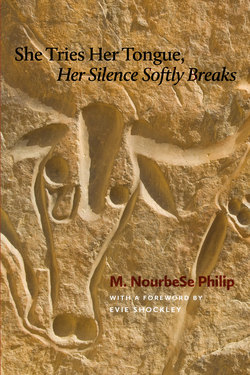Читать книгу She Tries Her Tongue, Her Silence Softly Breaks - M. NourbeSe Philip - Страница 9
На сайте Литреса книга снята с продажи.
Оглавлениеxmystied, yet strangely compelled by the unpredictable ways the pages of her book oered up language. I was lucky to have such a sure and dar-ing guide as Philip be the rst to lead me o the charted paths.The collection includes an essential essay: part autobiography,part Caribbean cultural criticism, part literary theory,and part critical race studies. In it, Philip carefully gives her readers a crash course in what they need to know — about the Caribbean values (at least among people of African descent in Tobago and Trinidad) that shaped her youth, about Caribbean immigrants in Canada, about postcoloniality (as the status of the Caribbean andof Canada), and about the transatlantic slave trade, as all these subjects relate to her need, desire, and ability to use language for self-expression, to write poetry.I had some of the necessary knowledge. Having grown up as one of Shange’s “colored girls” — “outside”Nashville, “outside”Chicago, and, at that point in my life, “outside”Durham, NC — I understood how speech tasted that came from what Philip calls “the lin-guistic rape and subsequent forced marriage between African and En-glish tongues.” I’d been having the same dish that Philip’s poems serve up, just with dierent seasonings. Shange’s characters’ search for self in cities across the United States (“bein alive & bein a woman & bein col-ored is a metaphysical dilemma / i havent conquered yet”) was akin to the desperate search of Philip’s Caribbean Ceres for her stolen daughter Proserpine:is pinch somebody pinch and tell me, up where north marry cold I could nd she — Stateside, England, Canada — somewhere about, . . . “. . . stop looking for don’t see and can’t — you bind she up tight tight with hope, she own and yours knot up in together; although she tight with nowhere and gone she going nd you, if you keep looking.” (“Clues”)Philip, born and raised in Tobago and Trinidad, and living as an adult through Toronto’s winters, might be read as metaphorically staging the Caribbean woman immigrant’s bifurcated identity through this mother-daughter relationship: bonds stretched, but not broken.The immedi-ate facts and representation of the split were dierent, butin whatever
